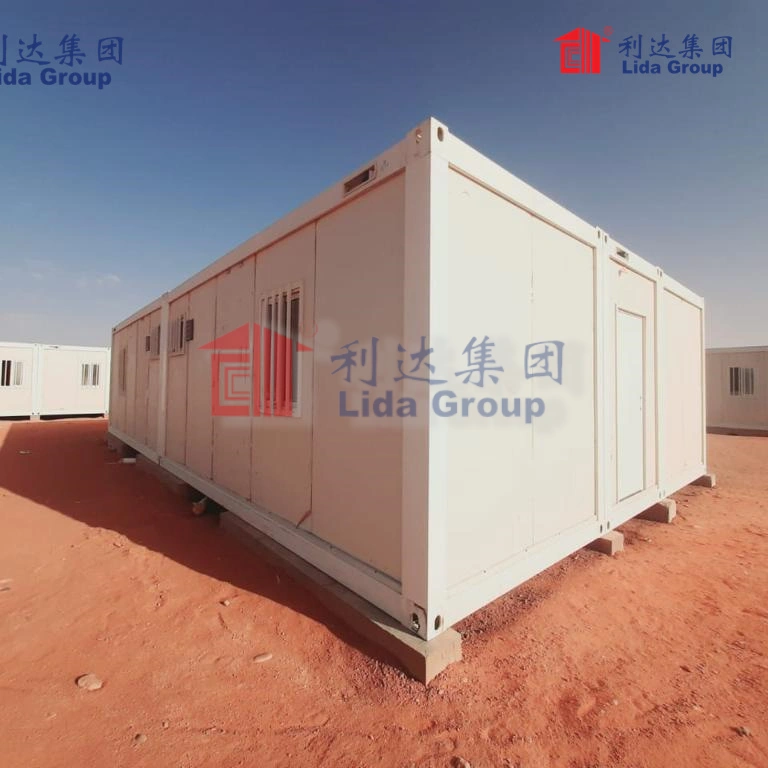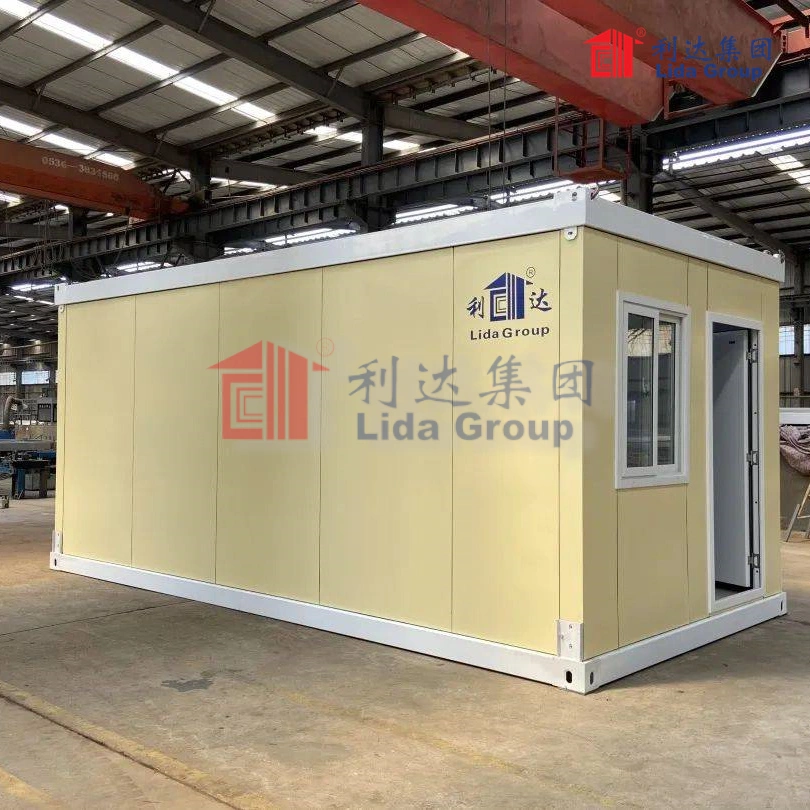Tel: 0086-532-88966982
0086-532-88965892
Website: www.lidajituan.com
E-mail: sales@lidajituan.com
Head office: 5th Floor, Building A, Dalen Center, 180 Haier Road, Qingdao, 266000, China
Off-Grid Innovation: Smart Modular House Solutions from Lida Group Power Remote Oil & Gas Operations in 2025
Classification:Industry News
Release time:2025-07-03 13:00
Off-Grid Innovation: Smart Modular House Solutions from Lida Group Power Remote Oil & Gas Operations in 2025
The relentless hum of diesel generators is the unwelcome soundtrack to remote oil & gas operations. Beyond the reach of power grids, operators face an impossible equation: burning $10,000+ daily in fuel while battling emissions targets and supply chain fragility. In 2025, as projects push deeper into energy deserts – from the Mongolian steppes to offshore Guyana – this paradigm is collapsing. Lida Group’s intelligent modular house solutions are rewriting the rules, transforming remote camps from diesel-dependent liabilities into self-sufficient, smart-powered operational hubs. This isn’t just off-grid living; it’s engineered energy independence.
The Remote O&G Energy Crisis: Beyond Diesel Dependency
Operating off-grid imposes brutal constraints:
- Fuel Logistics Nightmare: Transporting diesel across hundreds of miles of unpaved tracks or via supply vessels consumes capital and risks spills. Price volatility adds $1M+ annual uncertainty to project budgets.
- Emissions Trap: Diesel gensets emit 2.6-3.0 kg CO₂ per liter – torpedoing Scope 1 decarbonization goals and inviting carbon tax penalties.
- Operational Vulnerability: Generator failure halts drilling, processing, and safety systems. Spare parts delays cripple production.
- Noise & Pollution: Constant generator noise degrades worker rest, while particulate matter impacts air quality and health.
- Water Scarcity: Desalination/purification systems are energy hogs, compounding the power deficit.
- Data Blackouts: Unreliable power cripples communications, SCADA systems, and real-time monitoring.
Traditional container house camps exacerbate this crisis. Basic prefab building designs lack integrated energy systems, forcing ad-hoc solar additions that rarely meet base load demands. Lida Group’s approach is systemic: embedding intelligence and resilience into the modular house DNA.

Lida Group’s Off-Grid Architecture: The Five Pillars of Energy Autonomy
Since 1993, Lida Group has evolved from a China supplier of basic steel structure buildings into an off-grid systems integrator. Their 2025 solutions combine physical engineering with digital intelligence:
1. Energy Harvesting Fortress:
- Structural Solar Integration: Building-Integrated Photovoltaics (BIPV) embedded directly into modular house roofs and walls – not bolt-on panels. Monocrystalline cells with >22.8% efficiency withstand desert UV and salt spray.
- Wind Energy Hybridization: Micro-turbines structurally engineered into camp perimeter lighting or dedicated towers, generating power during low-sun periods.
- Thermal Energy Capture: Waste heat recovery from generators or process equipment redirected to pre-heat water or space heating via heat exchangers.
2. Intelligent Energy Management Ecosystem:
- AI-Powered Microgrid Controller: The "brain" optimizing energy flows:
- Forecasts solar/wind generation 72 hours ahead using weather APIs
- Dynamically balances loads between renewables, batteries, and backup generators
- Prioritizes critical loads (comms, safety systems, medical refrigeration) during shortages
- Learns consumption patterns to minimize generator runtime
- Cloud-Connected Analytics: Real-time dashboards showing camp-wide energy KPIs:
- Diesel consumption (liters/hr)
- Renewable penetration (%)
- Battery State of Charge (SoC)
- Carbon emissions avoided
3. Storage & Efficiency Core:
- Lithium-Ion Battery Banks: Containerized 200-500kWh systems with active thermal management (-30°C to +50°C operation). 10,000+ cycle lifespan.
- Ultra-Efficient Thermal Envelope: Vacuum Insulated Panels (VIPs) and triple-glazed windows achieve U-values <0.15 W/m²K – reducing HVAC loads by 60%+.
- Smart HVAC & Lighting: Occupancy sensors, daylight harvesting, and predictive algorithms slash phantom loads.
4. Water-Energy Nexus Innovation:
- Solar-Powered Desalination: Reverse osmosis (RO) units directly DC-coupled to solar arrays, eliminating inverter losses.
- Greywater Heat Recovery: Capturing warmth from showers/laundry to preheat incoming water.
- Rainwater Harvesting Intelligence: Sensors optimize collection/storage based on weather forecasts and consumption patterns.
5. Hydrogen Readiness (The 2025 Frontier):
- Structural Prep: Reinforced ventilation, leak detection conduits, and explosion-proof electrical zones pre-installed in office container modules.
- Power Conversion: Inverters compatible with future H₂ fuel cell input voltage/frequency.
- Safety Systems: Gas detection sensors with multi-gas calibration (H₂, H₂S, CH₄).

Case Study: Permian Basin Exploration Camp - From Diesel Dependence to Energy Sovereignty
Challenge: Support 50-person exploratory drilling in West Texas. No grid access. Diesel costs projected at $400k/year with 350 tons CO₂ emissions.
Lida Group Solution: Smart Off-Grid Camp
- 6x Modular House Units: BIPV roofs (25kW total), VIP walls (U=0.12 W/m²K)
- Energy Hub: 120kWh battery + AI microgrid controller
- Water: Solar-RO unit (5m³/day capacity) + smart rainwater system
- Connectivity: Starlink backhaul with LTE mesh network
Results (vs. Diesel-Only Baseline):
- Diesel Reduction: 87% (53,000 liters/year saved)
- CO₂ Avoidance: 142 tons/year
- ROI: <3 years (factoring diesel savings & carbon credits)
- Uptime: 99.98% (vs. 92% with legacy generators)
The Intelligence Layer: Transforming Containers into Data Hubs
Lida’s container building solutions embed IoT ecosystems:
- Structural Health Monitoring: Strain gauges detect foundation shifts or corrosion.
- Environmental Sensors: Track indoor air quality (PM2.5, CO₂, VOCs) in real-time.
- Occupancy Analytics: Optimize space utilization in office container complexes.
- Predictive Maintenance: Vibration sensors on HVAC units forecast failures 2-3 weeks pre-fault.
- Security Integration: AI cameras with edge processing detect safety violations or intrusions.
Flat Pack Advantage: Logistics Meets Renewables
Lida’s flat pack container systems enable off-grid deployment at speed:
- Pre-Integrated Conduits: Channels for solar wiring, data cables, and water lines factory-installed.
- Optimized Shipping: Compact components reduce transport emissions by 40% vs. standard modules.
- Rapid Commissioning: Plug-and-play connections cut installation time by 70%.
Why Lida Group Dominates Remote O&G Energy Innovation
Beyond being a China supplier, Lida delivers turnkey energy sovereignty:
- Vertical Integration: Controls BIPV panel sourcing, battery pack assembly, and control software development.
- Hybrid Expertise: 30+ engineered deployments across Arctic, desert, and offshore environments.
- Compliance Mastery: Designs to IEC 62109, UL 9540, and ATEX standards for hazardous area integration.
- Lifecycle AI: Machine learning algorithms improve performance continuously post-deployment.
2025 Off-Grid Frontiers: Where Lida is Headed
- Green Hydrogen Integration: Pilot projects coupling solar with electrolyzers for 100% renewable power.
- Advanced Battery Chemistries: Solid-state batteries for higher density and safety.
- Autonomous Energy Trading: AI trading surplus solar power via blockchain microgrids.
- Water-from-Air Tech: Integrating atmospheric water generators for desert sites.
Conclusion: Redefining Remote Operations Through Engineered Autonomy
For oil & gas operators in 2025, off-grid no longer means compromised. Lida Group’s intelligent modular house solutions shatter the diesel dependency cycle through integrated energy harvesting, smart management, and resilient design. Their container house and prefab building ecosystems transform remote camps from power-starved outposts into self-sufficient, data-rich operational centers.
By embedding solar generation into structures, optimizing every watt through AI, and preparing for hydrogen transitions, Lida delivers more than shelter – they provide energy sovereignty. The result: slashed operating costs, achieved decarbonization targets, eliminated fuel logistics risks, and uninterrupted operations where failure was once inevitable.
In the remote energy frontiers defining 2025’s projects, Lida Group doesn’t just supply buildings; they engineer the off-grid resilience that powers discovery and profit. When your operation lies beyond the grid, true power comes not from diesel tanks – but from intelligent design. That’s the Lida difference.
Pre
Contact Us
Head Office: 5th Floor,Building A,Darron Center,No.180,Haier Road,Qingdao, 266000,China
Tel: 0086-532-88966982 88965892 Fax:0086-532-88965571
WhatsApp:+86 13793209022
Mobile/Wechat:+86-15166671720
Email: sales@lidajituan.com Website: www.lidajituan.com
Alternate Website: www.lidamodularhouse.com
Head Office: 5th Floor,Building A,Darron Center,No.180,Haier
Road,Qingdao, 266000,China
Tel: 0086-532-88966982 88965892
Fax:0086-532-88965571
Email: sales@lidajituan.com
Website: www.lidajituan.com
Alternate Websit: www.prefabhousecn.com
Wechat/WhatsApp:+86-13793209022
Copyright(c)2023 All Rights Reserved SEO Business license

